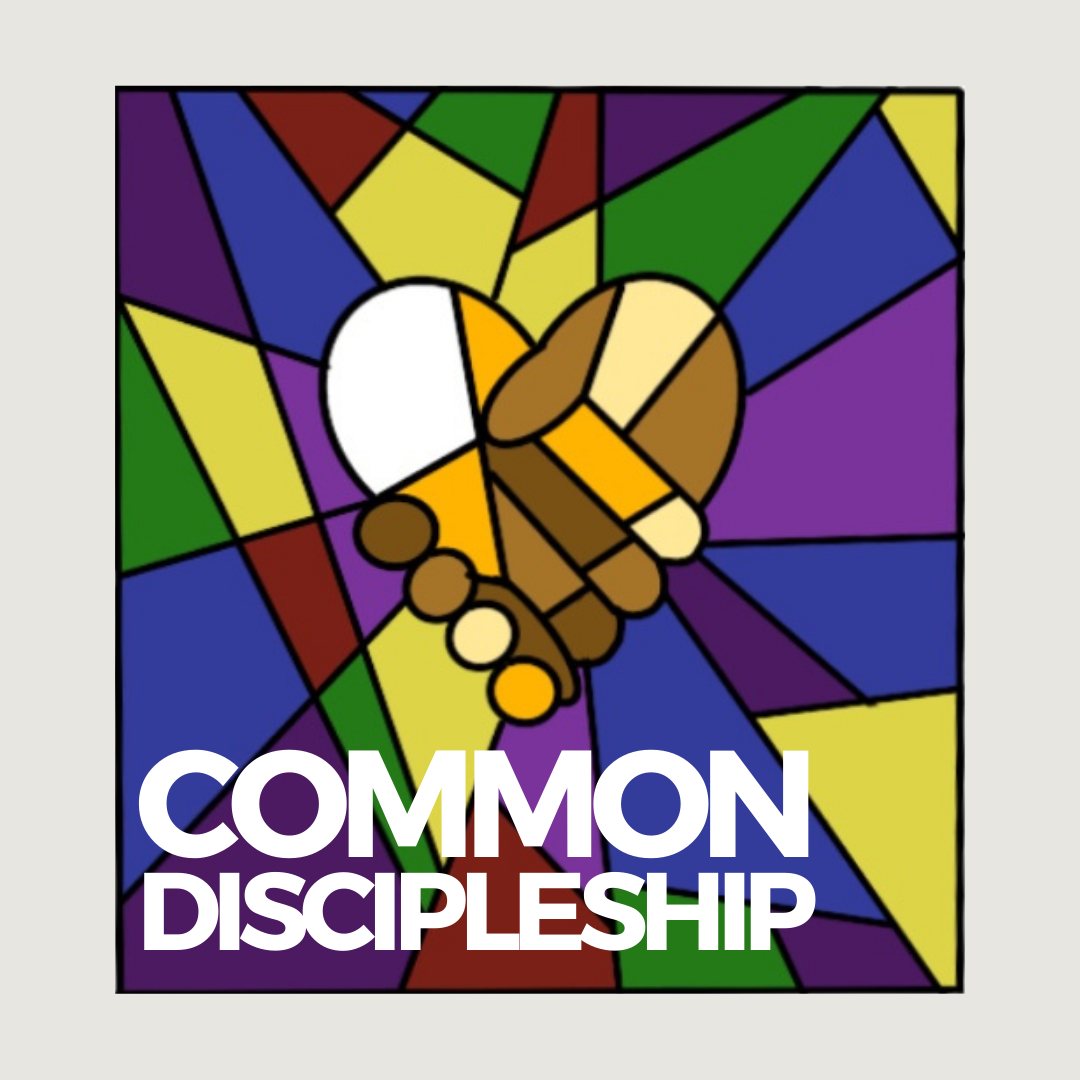
Trail Notes January 2025
By: Karen Webster
Comments: 0
Yes, we know it is only January; however, Travis and I are already planning for, and are excited about, this year’s Summer Series, titled “Common Discipleship: Living Out Our Faith in Daily Life.” Like last year, in addition to this being the summer series theme, it will also be our focus throughout our newsletters in 2025. More specifically, we will be exploring “common,” but often overlooked, aspects of Christian discipleship – how we spend our time, how we use our resources, how we eat – and how our attention to each of these areas impacts our collective lives and health as followers of Christ. These everyday practices, though seemingly ordinary, carry profound implications for our faith and witness.
One of the typical challenges of being a faithful disciple is the temptation to privatize our walk with God. Discipleship is often framed as “my personal relationship with Christ;” therefore, it frequently gets carried out through individual devotion (prayer, the reading of Scripture, journaling, etc.) in solitude. While this aspect of our faith is absolutely vital, it is incomplete without the counterbalance of living out our faith in community.
For example, the author of Hebrews writes, “And let us consider how to provoke one another to love and good deeds, not neglecting to meet together, as is the habit of some, but encouraging one another, and all the more as you see the Day approaching” (Hebrews 10:24-25, NRSVUE). This passage clearly reminds us that discipleship is not a solitary endeavor; rather, it is a shared journey of mutual encouragement, accountability, and growth.
Unfortunately, discipleship is not always a big community “walk in the park.” Especially right now, with so many of our interactions and so much of our rhetoric filled with anger, violence, fear, political divisiveness, climate concerns, and so much more, it can seem like it’s harder than ever before to extend love and good deeds to our neighbors, both within and beyond our communities of faith. How can we be expected to love our neighbors who are acting in unkind and unloving ways? Yet, this is precisely where our discipleship is most needed. How we treat our neighbors – those near and far – reflects the depth of our commitment to Christ’s call.
Dietrich Bonhoeffer, in his book Life Together, offers this insight: “The person who loves their dream of community will destroy community, but the person who loves those around them will create community.” Our call as disciples is to love those around us – to actively foster community through tangible acts of encouragement, service, and accountability. This creates spaces where faith is not merely professed, but practiced.
The small, common aspects of discipleship – how we spend our time, use our resources, and even the way we eat – are not only personal choices, but also opportunities to live out our faith in community. And, these actions, though simple (but not easy), create rhythms that shape our shared lives, offering encouragement and accountability as we grow together in Christ.
As January comes to a close and we begin 2025 together, here are some questions for consideration:
1. What does it look like to balance solitude with God and connection with others in my discipleship?
2. In what ways can I encourage and support my community of faith?
3. How am I being called to love my neighbor in the midst of the world’s current challenges?
4. Are there areas in my daily life – time, resources, or habits – where God may be calling me to more intentional reflection this year, so that my actions are in better alignment with being a follower of Christ?
It may seem common, insignificant, even impossible at times, but as we move into 2025, we want to encourage you to reflect on the common practices of your faith and how they impact your community. Trust in God’s Spirit to guide you, strengthen you, and bring us together, no matter what side of the church pews we are sitting on.
Peace,
Karen and Travis Webster
HSHC Co-Founders
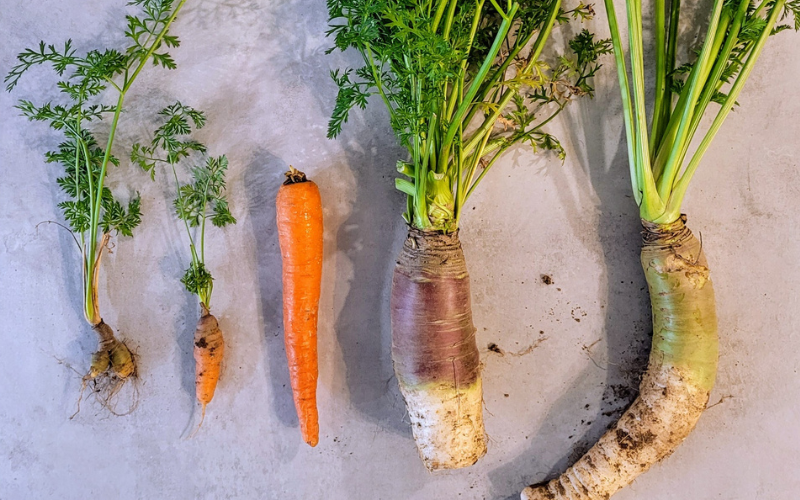
Trail Notes November 2024: Trampled Carrots and Faithful Growth
Scripture: Galatians 1:10 – “Am I now seeking human approval or God’s approval? Or am I trying to please people? If I were still pleasing people, I would not be a servant of Christ.” (NRSVUE)
With some guidance from God, I made the hard decision to withdraw from a marathon I had been planning for months. It felt, at first, like I was letting myself down—faltering, even. But gradually, I started to see that this decision lifted a huge self-imposed burden. I started finding more joy in my days – cooking, walking with Travis, and, of course, being able to spend more time in our garden.
Then, this fall, the deer returned for “Deer Debacle #2,” though this one was a bit less dramatic. They got in again, but only pruned a few greens and trampled through what was left of that carrot bed I never replanted after the first debacle. Frustrated, I went back to fixing the fence. But this time, while I was working, I noticed something. Hidden beneath the trampled foliage were a few untouched carrots, and they were HUGE! Somehow, these carrots had survived being trampled on multiple times; digging their roots deep and growing into something beautiful.
In that moment, I saw a deeper message. Those carrots had been hidden from me at first, buried beneath the mess, but they had grown stronger and deeper precisely because of all they had been through. They became a reminder of the ways God works in our lives: we plant our hopes, goals, and dreams like seeds, but we don’t always get to control how they grow. Some seeds thrive, some get trampled, but when we’re patient, nurturing, and hopeful, God brings surprising growth, even out of situations that feel broken or imperfect.
Reflecting on my garden this year, I saw so many parallels to my own journey with letting go of marathon training and trusting God with my time, my ambitions, and my relationships. The world often pushes us to be “perfect” or “productive” by its standards. But the truest productivity, the kind that pleases God, is not always about doing more or pushing harder. Sometimes, it is about stepping back, allowing space for what truly matters to grow, and trusting God’s timing.
So as we move into the holiday season, let’s remember those carrots. Life’s “deer debacles” may trample our plans, but in faith, we can trust that with God’s nurturing, what is meant to grow will bear fruit in its own time. Let’s sow seeds of kindness, rest, and faith, and watch as God brings them to full, unexpected beauty.
Reflection Questions:
1. Ambition & Expectation: In what areas of your life are you driven by ambition, and how do you discern whether this ambition aligns with God’s purpose for you? Are there any expectations—either from yourself or others—that may be getting in the way of this alignment?
2. Productivity: Think about what you consider “productive” in your daily life. How might God be inviting you to redefine productivity, focusing on what nurtures your wellbeing, relationships, and faith rather than simply meeting societal expectations?
3. Perfection & Popularity: Are there pressures in your life to appear perfect or gain others’ approval? How can you begin to let go of these pressures, trusting that God values your authenticity and faithfulness over society’s standards of success?
May all be well,
Karen H. Webster
HSHC co-founder/executive director
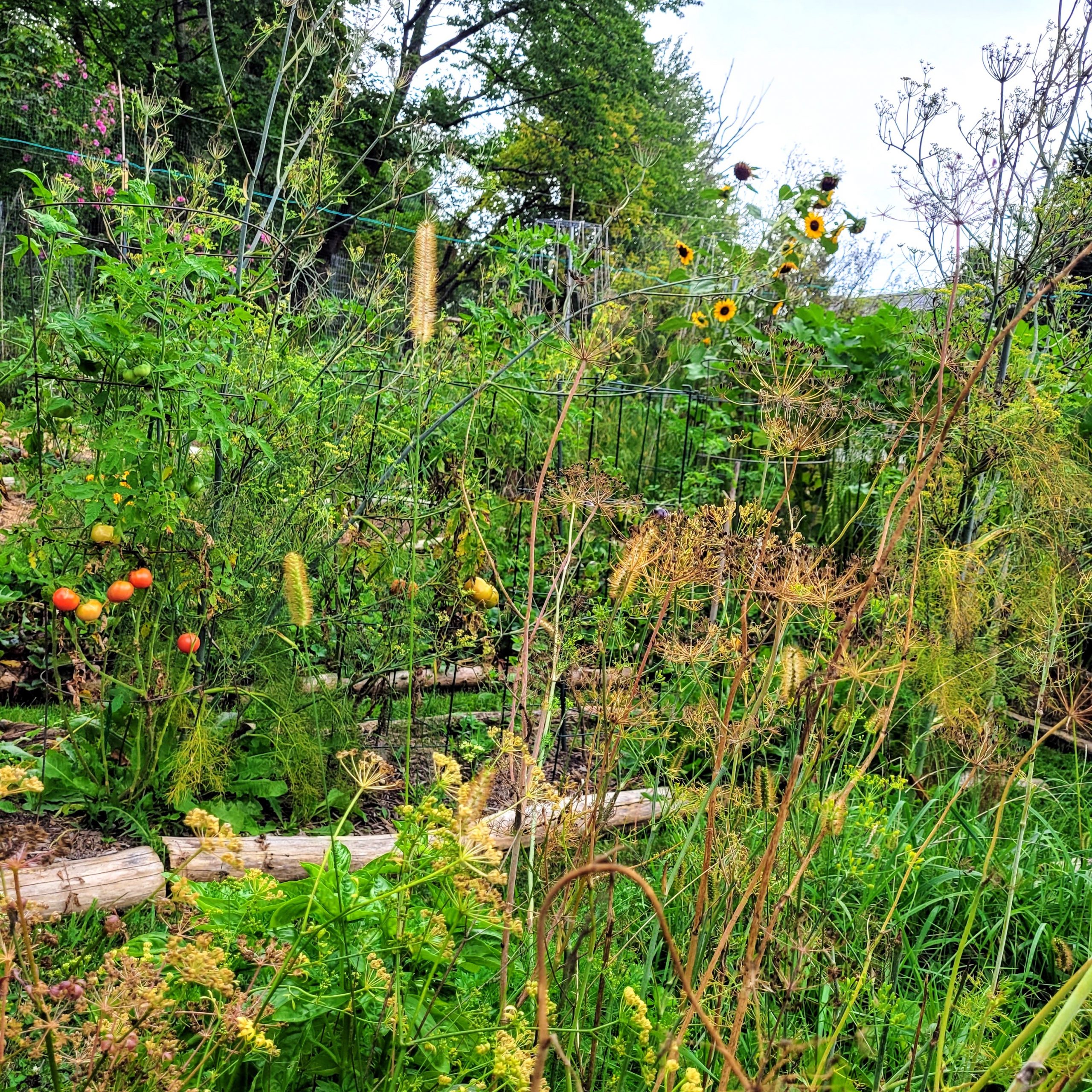
Trail Notes September 2024: Well Enough
It is not much to look at! The once-vivid display of color is now washed out. Many of the blooms are spent, and the aging tomato vines struggle to hold their fruit. In many instances, things have literally gone to seed (as captured in the forefront of the photo from left to right – parley, dill, and fennel), and much of the eager anticipation of what is to come has started to fade like a late summer sunset. The garden isn’t perfect. But, it is absolutely well enough.
This summer, as Travis and I explored the societal pressure of “perfection” as part of our four-week Summer Series, one of the phrases that came up fairly often in our conversations after worship or during our educational opportunities (in person and online) was the notion of “good enough.” In other words, rather than striving for “perfection,” many people found that aiming for “good enough” was much more realistic and attainable.
Now, on the one hand, I absolutely agreed when people shared this sentiment with me; but, at the same time, I found it unsettling. Why? The words “good enough,” at least in my mind, kept feeling like an excuse to do things half-heartedly, almost a sort of cop-out. This wasn’t what people were implying, but that is what my heart kept hearing. I was feeling the tension between wanting to do things well and taking healthy pride in what I do, while also wanting to remember God’s role and God’s grace in the midst of it all.
Upon reflecting on why I felt this way, I realized I needed to discover other words that I could use for myself that others might appreciate, too. It turns out that the phrase “well enough” actually fits what I was looking for, more so than I realized.
According to the Merriam-Webster dictionary, the definition of “well” includes [1]*:
- “ in a good or proper manner”
- “satisfactorily with respect to conduct or action”
- “in a kindly or friendly manner”
- “in a way appropriate to the facts or circumstances”
Thus, for me, “well enough” means striving towards excellence (proper manner, satisfactory action, rooted in kindness) while at the same time humbly acknowledging and relying on God’s grace (“for my grace is sufficient for you”) and power (through Christ who dwells in me) to approach the circumstances appropriately. Or, more simply put, “well enough” in my mind means striving to do things “well” while also being prayerfully attentive to when “enough” is enough!
Returning to our garden, it certainly isn’t what it was several months ago, but its actions are absolutely “appropriate to the circumstances.” For example, the sunflower petals are beginning to shrivel up and the stems can barely hold the weight of the plants now, so it may seem as though the beauty of the plants (their “perfection”) is starting to wane. However, the sunflowers are signaling to us, the many goldfinches (one hidden in the photo), and other pollinators that visit our garden that the seeds are ready to harvest. Similarly, the “spent” (dying) parsley, dill, and fennel plants are all currently preparing to sow their seeds upon the earth so that new plants will come again next spring.
The late-summer garden is not the beautiful, fresh garden of the spring, nor should it be. Rather, it is exactly what it is supposed to be right now: producing food for animals who are preparing for the winter and putting down the seeds that will sprout into next season’s life when winter breaks. It is a well-enough garden, appropriate for its time, place, and function. Perhaps we can take a lesson from this for our own lives: rather than trying to live into some constant, objective, elusive notion of “perfection,” we can recognize that we are well enough, too.
May all be well (enough),
Karen H. Webster
HSHC co-founder/executive director
P.S. – Please check out our “Health Highlight” section in our September 2024 newsletter for some “well enough” reflection questions and several articles that provide some strategies for approaching “perfection” in a healthier way.
Reference:

Trail Notes June 2024: Popularity: A Relentless Taskmaster
As I write this newsletter article, I am mindful that the old local high school, which I am told was built in the 1950’s, is being torn down just a couple blocks from our home. I pass it every day on my way to and from church; each time I go by, a new wall has been removed, exposing classrooms, chalkboards (the old-fashioned green kind), hallways, and stairwells to the elements. When Karen and I first arrived in Murrysville in spring 2021, we didn’t realize that it was in its last few months of use, and it has stood quiet ever since, until its demolition commenced.
Although the school has no personal meaning to me, I know its destruction has brought sadness and a sense of nostalgia to generations of students. Every time I see it, I think of the tremendous amount of life that unfolded in that place: the epiphanies, the joys, the heartaches, the dramas that are part of adolescent existence. If those crumbling walls could talk, they would speak countless words about what it means to be a young person learning how to make one’s way in the world.
I wonder what those falling bricks, wrested from their seemingly unyielding stations, would say about the human desire for popularity? I am sure they could witness to a phenomenon that has been consistent across countless millennia: people want, often desperately, to be liked. Frequently, we want to be liked so badly that we are willing to sacrifice much of what makes us who we genuinely are in order to be understood in particular ways.
The drive to be popular is an exceedingly powerful force. Even those of us who are well past that age struggle with the same concerns. Peer pressure, comparisons, and the in-crowd are powerful concepts that we never really escape. The impulse to be popular can prompt us to subscribe to often hideous fashions, it can drive us to say often disingenuous things, it can move us to reject often constructive advice. Popularity is a relentless taskmaster.
The Bible is quite realistic about the human craving for popularity. When Samuel was called to anoint the next king of Israel, God warned him about relying on visual presentation alone: “Do not look on his appearance or on the height of his stature, because I have rejected him, for the Lord does not see as mortals see; they look on the outward appearance, but the Lord looks on the heart.”[1] God is directly warning us not to get caught up in the physicality of this mortal world, but rather, to look deeper.
In Luke 9:25, Jesus asks, “For what does it profit them if they gain the whole world but lose or forfeit themselves?”[2] Here, Jesus confronts authenticity, preaching that no amount of secular success is worth surrendering our spiritual integrity.
Addressing a nascent church operating in the seat of secular imperial power, Paul wrote, “Do not be conformed to this age, but be transformed by the renewing of the mind, so that you may discern what is the will of God – what is good and acceptable and perfect.”[3] Paul clearly recognizes the importance of not getting caught up in the “fad” of the time, but staying true to God’s intention.
As I pass the school, I try to think not only of the nostalgia, but also of the symbolic breakdown of the pressures of popularity those students must have felt, and that I feel even today. As each falling brick exposes a new chalkboard, so too does the facade of popularity fall. Maybe we can learn from this symbolism, breaking down our own facades of disingenuity.
It is easy to get caught in a seemingly intractable tension: between being popular and being genuine. Yet, when the ‘school’ comes down, it’s not about the approval of your classmates or colleagues, but of yourself and God. The hard, true question we all need to ask ourselves becomes clear: Whom are we trying to please? When we are honest about that, the concept of popularity becomes less a matter of survival than it does one of perspective. If we are trying primarily to make other people happy, there are infinite standards of concern; if we are trying primarily to live in ways acceptable to God, there is only one viewpoint that truly counts.
Maybe that’s what a lot of life is about: discerning whose opinion matters – that of being “beloved by the people”[4] (which is what the word “popularity” literally means), regardless of how fickle a benchmark that may be, or recognizing that we are the beloved of the eternal Lord, no matter what.
The choice of concentration is ours, but the reality is not. Thanks be to God for holding us, accepting us, and loving us when the walls crumble and we are faced with our raw and authentic selves.
Peace,
Travis
HSHC Co-founder
P.S. – I hope you will join us for our upcoming summer series where we will be exploring popularity and other social pressures (productivity and perfection). Click here to learn more, and click here to register.
References:
[1] 1 Samuel 16:7
[2] Luke 9:25
[3] Romans 12:2
[4] https://www.etymonline.com/word/popularity, viewed May 20, 2024.

Trail Notes April 2024: Productively Wasting Time
I have always found April to be a challenging month. During the winter months, some aspects of my life are able to hibernate (certain home, garden, and work projects), but then spring, a season literally and figuratively budding with new life and possibilities, arrives, and I am suddenly inundated by a real sense of urgency and hurry. There is now so much to do. I’ve now got to be more productive and stop wasting time!
As we mentioned in both our January newsletter and our introduction for this month’s newsletter, the theme we are focusing on this year in our newsletter and summer series is “Pressure Points,” reflecting on some of the stress in our daily lives (productivity, perfectionism, and popularity) and possible ways we can respond more healthfully to them.
Therefore, rather than allowing myself to get caught up in my normal April frenzy, I intentionally made myself pause and consider: what do “productivity” and “wasting time” really mean?
Turning to one of my favorite resources, the Webster’s dictionary (sadly no familial connection), “productivity” is defined as:
-
- Having the quality or power of producing, especially in abundance.
-
- Yielding results, benefits, or profits.
-
- Effective in bringing about.
What struck me about this is that, societally speaking, there is a lot of emphasis placed on the first two entries for the word – “producing in abundance” and “yielding results and [particularly] profits,” which in some instances are important and should be sought after.
Yet, I believe it is the third entry for the word – “effective in bringing about” – that needs further exploration, particularly for those who are seeking to bring about God’s reign on earth (here and now).
In other words, how effective are we being in terms of loving our neighbors? Or cultivating relationships, especially with those who see the world differently than we do? Or creating intentional spaces where joy can be experienced by all who have gathered?
Regarding the definition of “wasting time,” Wikipedia Encyclopedia (which is not considered a scholarly resource, but I found it provided some helpful insight) stated that it “may refer to:
-
- Idleness, a lack of motion or energy.
-
- Goofing off, engaging in an idle pastime while neglecting obligations.
-
- Procrastination, avoidance of doing a task.”
Again, when I looked at these three entries, I found that all of them conformed to society’s general negative understanding of the term “wasting time.” And therein, I believe, lies one of our challenges. “Wasting time” can certainly become a problem when obligations and responsibilities are neglected. However, “idleness” or “ a lack of motion” is not, and should not always be considered, a bad thing.
In fact, many “successful” people (whether in business, music, arts, professional sports, etc.) have mentioned how “wasting time” is a vital aspect of their “productivity.” [Click here to read about the benefits of “wasting time.” Note: several articles about this topic that I prefer more have recently gotten moved to behind a paywall.]
Likewise, Jesus often paused in his ministry to rest and pray as he went about “productively” sharing God’s love with the world.
Therefore, this month, and hopefully in the months to come, I want to challenge us all to slow down and to intentionally “waste time” so that we can hear from God how to be more productive/ “effective in bringing about” the abundant life that God wants for us all.*
Here are some reflection questions for your consideration:
-
- What does “productivity” look like to you? Thoughts? Words? Images?
-
- Do you constantly feel like you are in a hurry or rush? What is fueling that feeling?
-
- How have deadlines, timelines, and bottom lines affected your pace of life? What sort of power have you given to these imaginary lines? What options do you have?**
-
- How would you define “wasting time”?
-
- When are “productivity” and “wasting time” compatible? When are they not?
-
- What are some of your favorite ways to productively “waste time?”
Eastertide Blessings,
Karen H. Webster
HSHC Co-founder/Executive Director
*To have more opportunities to reflect on this topic be sure to register for our Summer Series (registration opens Monday June 3, 2024)! ** The questions in this bullet point were taken from the Spiritual Disciplines Handbook: Practices That Transform Us, by Adele Ahlberg Calhoun (2015), page 80.
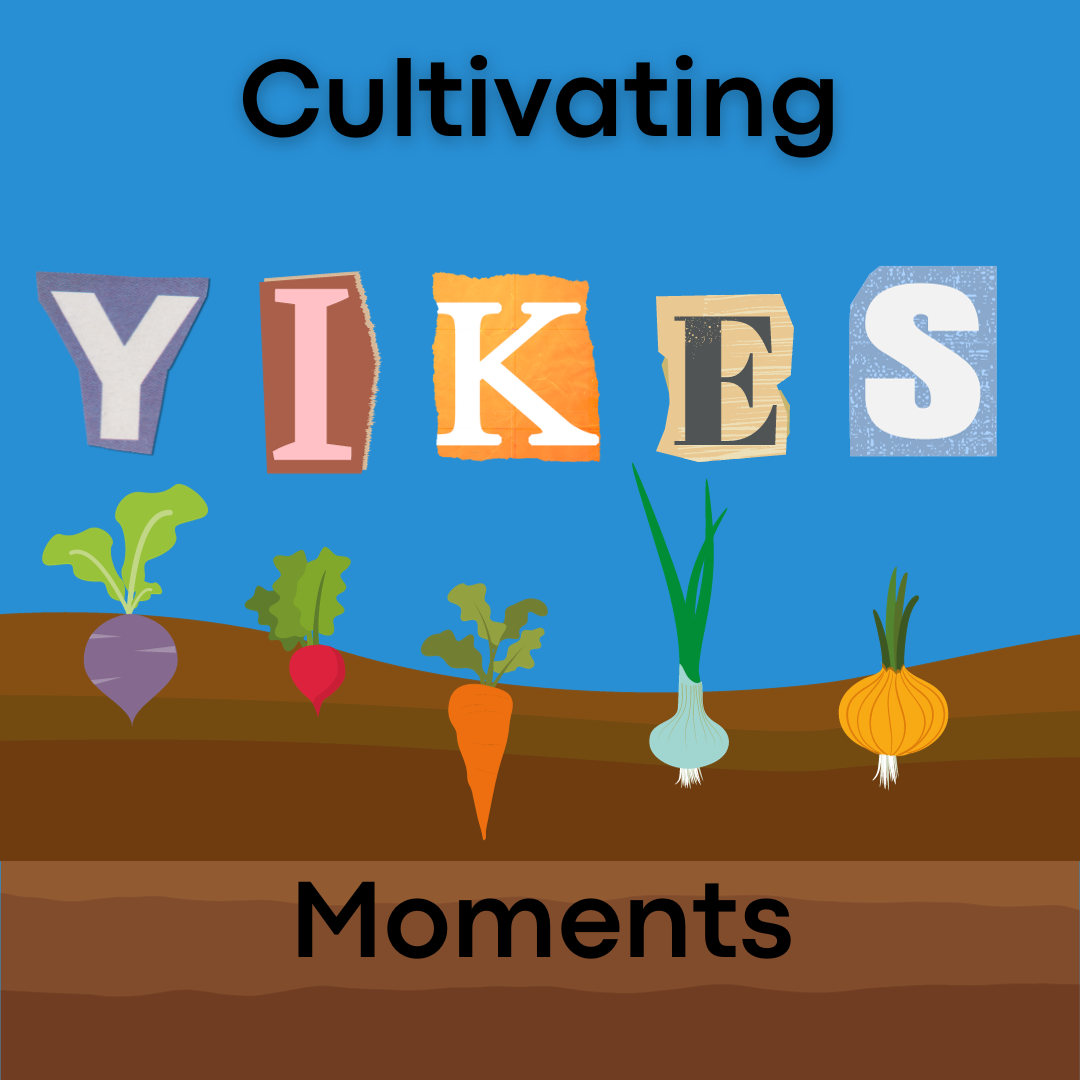
Trail Notes January 2024 : Cultivating “Yikes” Moments
Cultivating “Yikes” Moments
Several weeks ago, on the eve of Epiphany (January 6th), I texted a life-long mentor/friend/colleague in ministry, with one of my epiphanies for the year, thus far. I wrote, “Some of the seminarians currently in school right now were born in 2000 and 2001. Yikes!”
The fall of 2001 is when my husband and HSHC co-founder, Travis, and I started our studies at Princeton Theological Seminary… the year some of the current students were born. Where had the time gone?
My friend responded by saying, “And Happy Epiphany (Eve) to you! “Yikes!” is the appropriate response to life’s epiphanies. It captures the wonder and worry, the awe and apprehension, which accompany the beam of new understanding in one’s head and heart…”
As mentioned in the introduction to this newsletter, this year, we will be examining some of the “pressures points” in our lives. This will be centered on the pressures to be – perfect, popular, and productive – and how all of these can cause us stress, potential health problems, and decreased wellbeing. More specifically, our quarterly newsletters, Summer Series (June 30 – July 21st), and other educational opportunities will all be focused around this theme.
In addition to investigating each of these “pressures,” we will also provide some (hopefully) helpful strategies to respond to them in a more healthful manner. For example, in each of our newsletters, we will provide information about a variety of spiritual practices that can help to offset the negative impact that “pressure points” can have on our lives.
It is our hope that, through bringing about awareness about these pressures and pausing for reflection through the various spiritual disciplines, God will provide us some “Yikes” moments – opportunities to see what is in front of us this year with new understanding in our heads and hearts.
We hope you will join us… but no pressure. 🙂
May all be well,
Rev. Dr. Karen Webster
HSHC Co-founder/Executive Director
“Arise, shine, for your light has come, and the glory of the Lord has risen upon you.” – Isaiah 60:1 NRSVUE

“Lightening Up” Expectations
“Lightening Up” Expectations
With the holiday season close upon us, it’s natural for our stress levels to start to rise. Why does this happen in such a predictable pattern every year? Perhaps, in part, it’s the expectations we set for ourselves and others. We may make it our mission to set the perfect table, find the cutest photos for holiday cards, create boxes filled with homemade goodies, or find the perfect gifts for everyone on our list.
Or perhaps some of our stress and expectations fall along relational lines. We expect the headstrong child to return home for the holidays, estranged relatives to reconcile, and neighbors to get along.
However, I would like to encourage you to reflect upon your holiday expectations (or other expectations that you are wrestling with right now) and consider whether you can lighten any of them up. I know for me, my “middle-aging” body has forced me to reflect on some of my personal expectations.
In September, I ran the Berlin marathon—a goal which took two years of planning. First, my goal was to qualify and, second, to run under my target time.
Did I meet my expectations? Yes and no.
Yes, I qualified for the 2023 Berlin marathon.
Yes, I completed it within my target time.
No, I did not expect that now, almost two months later, I would need to completely stop running (something I have not done in more than fifteen years other than an occasional week here or there) to give my body time to heal.
While slowing down has certainly been challenging, it has also shed some new light on my holiday and future expectations. As we head into this holiday season, I have been reminded that:
- Some expectations we set are realistic, and some are not.
- Sometimes, there is a cost to meeting ours or others’ expectations.
- Sometimes, expectations will be met, but perhaps not within the timeframe we initially set or in the way we envision.
So…how do we deal with this tension between planning for anticipated outcomes and accepting reality as it unfolds?
Scripture speaks of Jesus as the light of the world (John 8:12). When we, as disciples, walk in the light, we gain increasing clarity about who and what to center our lives around: Jesus and Love.
In this season when daylight doesn’t last as long as we would like, we can set aside more time to soak in the light of God’s word. Doing so will help us shine Christ’s light and love and establish healthier expectations of what that looks like in practical terms.
It will also give us a sacred space in which to recharge during this busy season. We are told not to cover our light under a bushel basket, but this does not mean our light has to be “always on.” Seeking activities that replenish rather than drain our energy may translate into paring down your holiday feast to give yourself more time to spend with family. For me, slowing down has enabled me to be gentler on myself and others when we don’t meet my expectations.
So this season, when you sense your spirit tiring, why not respond to God’s open invitation to walk and talk out in the sunshine (of course, for those of us living in colder climates, this may mean throwing on another layer or two!)? This activity is doubly beneficial because spending time in the physical light (sunshine) also improves our health in multiple ways. For us humans, light is essential for healthy bones, mental wellbeing, immune and neuromuscular function, glucose regulation, and decreasing some forms of cancer and other diseases.
In addition, spending time in nature gives us the opportunity to connect with plants, which need sunshine as much as we do. In plants, light generates food (photosynthesis), creates new growth cycles, and promotes healthier development. Being outside also reminds us how connected we are to all of creation and gives our own body a chance to relax.
As counterintuitive as it might feel at first, the next time you’re overwhelmed by expectations (like the endless to-do list), I want to encourage you to pause and plug into the various sources of life-giving light that are all around you.
To learn some more tips and strategies for establishing and nurturing healthier expectations, we have provided a few resources in the “Health Highlight” section of our newsletter.
May the light of Christ shine upon you this holiday and into the new year,
Karen Webster
HSHC Co-founder/Executive Director
*Photo Credit: Canva
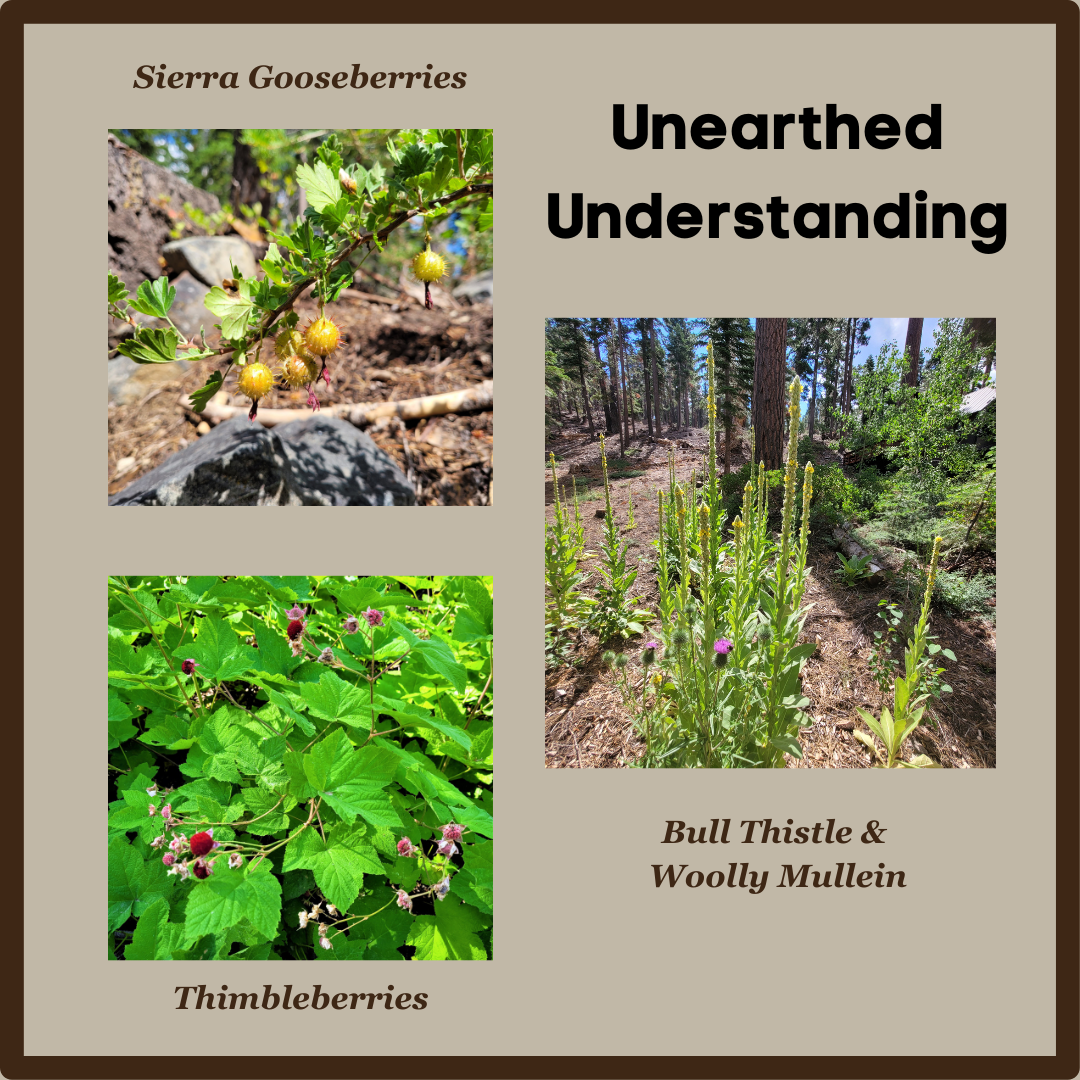
Trail Notes September 2023: Unearthed Understanding
Unearthed Understanding
Last month, Travis and I spent a week at my family’s cabin near Lake Tahoe, California. As we planned the trip, we realized how curious we both were to see how much things had changed since last summer (when California was in a severe drought) versus this summer (after a very wet and snowy winter, particularly at Lake Tahoe!). As we expected…everything was lush and green. However, the wildflowers were unlike anything we had ever seen before, in some cases, literally!
Intrigued, I found myself asking – how is it possible, after spending 45+ years of my life going to our cabin, that I have never seen something as remarkable and/or painful looking as the “Sierra Gooseberry” or as tasty as a “Thimble Berry” (yes, they are safe to eat!). And what caused a guy with a large machete (no joke!) to wander by our cabin and chop down some “Woolly Mullein,” plants which I hadn’t paid much attention to in the past? What was going on?
After a little investigation, I discovered that I hadn’t noticed these plants before due to a combination of factors. Yes, last winter’s significant precipitation played a part. However, it was more the fact that in the fall of 2021, the National Forest Service thinned out a significant number of trees around our cabin as a fire precaution. While fewer trees definitely increased the amount of sunlight around our cabin, the biggest reason these plants had “suddenly appeared” was that the soil had been disturbed by the logging trucks.
It turns out that – Sierra Gooseberry, Thimbleberry, Bull Thistle and Wooly Mullein – all prefer, and in many instances thrive in, soil that has been disturbed.
What can this “disturbed” soil teach us about faith?
Over the last several years, the farming and home gardening communities have increasingly focused on not disturbing soil, because disturbing soil disrupts its structure, decreases its carbon content, and accelerates erosion, among other challenges. [To learn more, click here.*]
However, in this instance, was the movement of the soil around our cabin good or bad? Both.
The soil stirred up around our cabin by the logging trucks caused beneficial plants like the Sierra Gooseberry and Thimbleberry (both nutrient dense for humans and good for pollinators) as well as Bull Thistle and Wooly Mullein (both invasive weeds) to surface.
How often in our lives of discipleship does the soil of our faith (the foundation of our spiritual growth) get disturbed by life circumstances causing both “beneficial plants” (new opportunities, relationships, jobs, etc.) and/or “invasive weeds” (illness, grief, death, loss, etc.) to spring up?
When faced with this, how are we to respond?
We may be tempted to blame God or others, when unwelcome events invade our lives. However, Job 5:6 reminds us: “Misery does not come from the earth, nor does trouble sprout from the ground.” (NRSVUE). Job 5:8-9 gives us a course of action for times when desperate circumstances appear from out of nowhere: “If I were in your shoes, I’d go straight to God, I’d throw myself on the mercy of God. After all, he’s famous for great and unexpected acts; there’s no end to his surprises.” (The Message).
In our “disturbed” moments, it is important for us to keep a wide perspective, to see both the good and the bad, and to patiently watch for the movement of the Holy Spirit and the “new growth” it will produce.
Reflection Questions:
- What is “disturbing” your spiritual soil right now?
- Rather than judging the soil (or yourself) as good or bad, ask yourself (with compassion): What has helped or hurt my spiritual growth this year?
- What are some ways you can be more intentional about tending to your spiritual soil (both now and in the weeks to come)?
Peace,
Karen Webster
HSHC co-founder and executive director
*Note: this article discusses the overall benefit of the no-till method for our country and the world within the context of Pennsylvania farming practices.
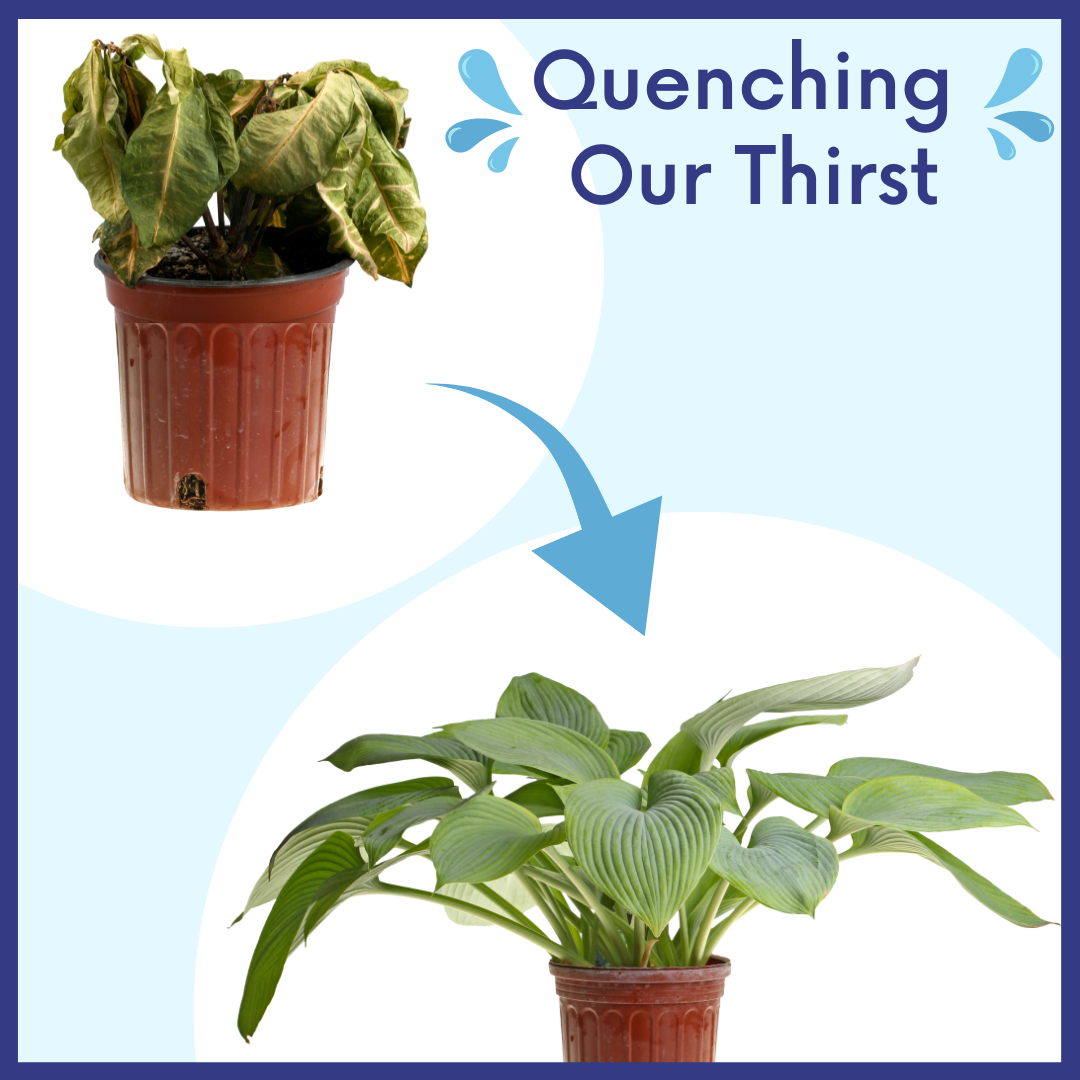
Trail Notes June 2023: Quenching Our Thirst
Quenching Our Thirst
Scripture: “…while Jesus was standing there, he cried out, ‘Let anyone who is thirsty come to me.’” – John 7:37 NRSVUE
Last month, I was invited to lead a lesson at Club 45, a weekly gathering of 4th and 5th graders at Newlonsburg Presbyterian Church in Murrysville, PA. Rain was on the forecast for the evening (fitting that our topic was water and hydration). I ended up with a room fuller than usual with young people. Many of them have sports practices (which is why I picked hydration as our topic) that often meet at the same time as Club 45, but since it was raining, their practices were canceled. This resulted in a very high energy evening, as many of them are used to burning off their energy at practice. I was left enthusiastic but exhausted!
After a quick introduction, I started the lesson by asking the students the following questions:
- Do you think it would be a good idea to give small children, animals, or plants soda or a sports drink? What would happen if we did?
- What are the differences between the healthy watered plant and the unhealthy plant? (I included the image with this message).
- What do you think might happen to our bodies if we stopped drinking mostly water and drank soda, fruit drinks, and sports drinks instead? Or if we simply stopped drinking much at all?
My reflection question for you – how would you respond?
Water is what human beings, animals, and plants were designed to drink. Drinking water is what helps us stay healthy! For example, water helps to regulate our body temperature and to moisten tissues in our eyes, nose, and mouth.¹ It protects our bodies, organs, and tissues; carries nutrients and oxygen to cells; lubricates our joints; and lessens the burden on our kidneys and liver by flushing out waste products, among other things! Likewise, for plants, water is an essential nutrient and, in fact, comprises up to 95% of a plant’s tissue. Water is required for a seed to sprout, the carrying of nutrients throughout the plant, transpiration (which keeps the plant from overheating), and so much more!²
Drinks other than water often have added ingredients that get in the way of water’s ability to do what it’s supposed to do for us. (Want some hydration tips? Be sure to check out our health highlight section in this newsletter)!
Sports drinks certainly have their place; as an active long distance runner, I use them on long runs. However, they are generally not necessary for exercise lasting less than an hour. For this level of exertion, water will suffice. (For more information on how to utilize sports drinks appropriately, click here. For information specifically for children, click here).
As for soda-coke-pop, consider reserving it for special occasions and instead quench your daily thirst with flavorful alternatives. For example, if you haven’t tried fruit/vegetable/herb infused water, I encourage you to do so. Check out our recipe link for some ideas — the Club 45 youth gave the three samples we shared with them (orange/lemon/lime, tangerine/blueberry, and cucumber/lemon/mint) a huge thumbs up! Also, if you’d like a healthier soda alternative, check out that recipe as well. That, too, received the youth’s approval!
In addition to quenching your physical thirst this summer, I also want to encourage you to be attentive to hydrating yourself spiritually.
If you’re anything like me, you tend to push yourself pretty hard through the fall-winter-spring seasons of life and you always look forward to the slower summer months, when you not only physically slow down (which makes it easier for you to care for your physical hydration needs) but also find it easier to carve out more time to spiritually hydrate yourself (through prayer, “sipping” on good spiritual books, enjoying time in God’s creation both by yourself and with others, etc.).
Likewise, I challenge you to discover and practice new ways of making mind-body-soul hydration part of your daily routine this summer. And, if you are willing, we’d love for you to share some of your spiritual thirst-quenching recipes with us!
Peace,
Karen H. Webster
HSHC Co-founder/Executive Director
¹Allie Wergen, “Water: Essential for your body,” September 29, 2022, Mayo Clinic Health System, accessed at https://www.mayoclinichealthsystem.org/hometown-health/speaking-of-health/water-essential-to-your-body.
² Jodi Richmond, “How Plants Use Water,” WV Extension, March 1, 2021, accessed at https://extension.wvu.edu/lawn-gardening-pests/news/2021/03/01/how-plants-use-water.

